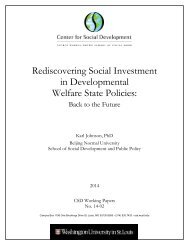Exploring and Assessing Intercultural Competence - Center for ...
Exploring and Assessing Intercultural Competence - Center for ...
Exploring and Assessing Intercultural Competence - Center for ...
Create successful ePaper yourself
Turn your PDF publications into a flip-book with our unique Google optimized e-Paper software.
Cultural <strong>Competence</strong> Self-Assessment Instrument<br />
This instrument helps identify, improve <strong>and</strong> enhance cultural competence in staff relations <strong>and</strong><br />
client service delivery. (Washington, D.C., Child Welfare League of America Publications;<br />
1993; Catalogue number 5065)<br />
Cultural <strong>Competence</strong> Self-Assessment Questionnaire (CCSAQ)<br />
Mason, J. L. (1995). Portl<strong>and</strong> State University. Instrument designed to assist service agencies<br />
working with children with disabilities <strong>and</strong> their families in self- evaluation of their crosscultural<br />
competence. Intended <strong>for</strong> US domestic use.<br />
Culture-free Scale<br />
This instrument, developed by Chen <strong>and</strong> Starosta, measures intercultural sensitivity.<br />
The Cultural Orientations Indicator® (COI®)<br />
TMC’s COI® is a web-based cross-cultural assessment tool that allows individuals to assess<br />
their personal cultural preferences <strong>and</strong> compare them with generalized profiles of other<br />
cultures. The COI® provides respondents with a personal cultural profile based on ten<br />
dimensions that have particular application in the business world. The underst<strong>and</strong>ing gained<br />
from the personal profile, which is based on TMC’s Cultural Orientations Model (COM), can<br />
be applied to the development of specific business, management, sales, marketing,<br />
negotiation <strong>and</strong> leadership skills, among others, when applied in multicultural situations. A<br />
validated report is available upon request.<br />
http://www.tmcorp.com<br />
Cultural Self-Awareness Test<br />
This simple three-question test helps identify high <strong>and</strong> low-context characteristics in those<br />
who take it. (The Management <strong>Center</strong>, Graduate School of Business, University of St. Thomas,<br />
Minneapolis, MN).<br />
The Culture in the Workplace Questionnaire is derived from the work of G.Hofstede,<br />
<strong>and</strong> enables you to learn your own cultural profile <strong>and</strong> how that might compare to<br />
others. http://www.itapintl.com/ITAPCWQuestionnaire.htm<br />
Development Communication Index<br />
(Developed from Kealy study) This field instrument was used to assess the quality of<br />
communication <strong>and</strong> the accuracy of perception between Canadian advisors <strong>and</strong> their national<br />
counterparts working on a development project. This index represents 30 scenarios related to<br />
such issues as project progress <strong>and</strong> adaptation skills. Instrument also designed as a problemsolving<br />
tool. http://www.tamas.com/samples/source-docs/ROI-Briefings.pdf<br />
Dogmatism Scale<br />
Milton Rokeach, 1960<br />
Educoas, Editorial February 2002<br />
Maintains the premise that the Internet holds great promise as a tool to foster intercultural<br />
communication to create responses to development needs in the Hemisphere.<br />
http://www.educoas.org/eng/editorial_feb.asp<br />
European Language Portfolio<br />
This tool, developed by the Council of Europe in collaboration with the Common European<br />
Framework, uses three parts (a passport, a language biography <strong>and</strong> a dossier) to self-assess<br />
intercultural competence (Karen-Margrete Frederiksen, “Foreword: <strong>Intercultural</strong><br />
<strong>Competence</strong>”).<br />
Expatriate Profile (EP) - Park Li Group. (1996). Expatriate profile workbook. (Second ed.).<br />
New York: Author. Expatriate Profile is a computer-based cross-cultural competence selfassessment<br />
instrument <strong>for</strong> international professionals.<br />
Foreign Assignment Success Test (FAST)<br />
Black, J. S. (1988). Work role transitions: A study of American expatriate managers in Japan.<br />
Journal of International Business Studies, 19(2), 277-294. Six scales. Validated on 67<br />
American managers in Japan.<br />
Fuld & Company, Inc.<br />
Competitive Intelligence (CI)CI Learning <strong>Center</strong> &Tools<br />
http://www.fuld.com/ciStrategiesResources.html<br />
GAP Test: Global Awareness Profile<br />
J. Nathan Corbitt. The GAP measures how much world knowledge a person has concerning<br />
selected items about international politics, economics, geography, culture, etc.<br />
<strong>Intercultural</strong> Press, ISBN 1-877-864-55-2 P.O. Box 700 Yarmouth, ME 04096 USA<br />
88
















